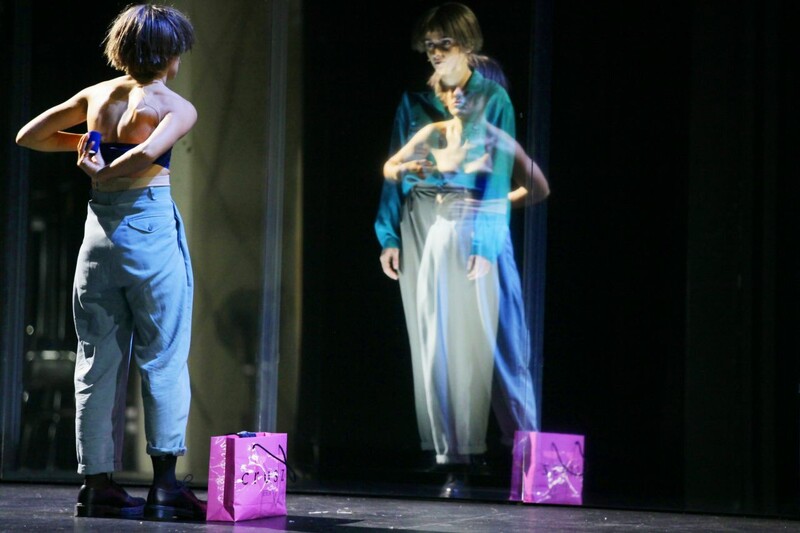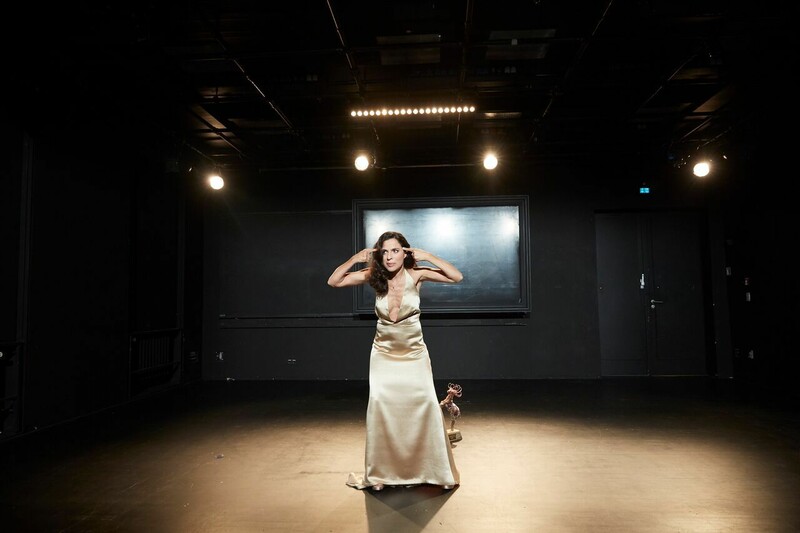Sasha Marianna Salzmann
Works

Play, 2019
Eight young female bodies are lying in a tent, breathing in unison and protecting the rifles under their mattresses, waiting for the next mission. Their nightmares during the night and the daydreams of army’s everyday life are experienced together.
They learn to survive, they salute their dead comrades, and also learn that the mattresses belonging to soldiers who commited suicide will be thrown away. Still the eight young soldiers will be among the martyrs who fell for their country. Again and again the soldiers circle the multiple possibility of their own death. What dies in a person when they operate the trigger of a loaded gun? When does the dispossession of your own body begin?
Memories of childhood weave themselves into the spiral-shaped experience of the loss of self: when the father drummed on the steering wheel as the small family drove through the country safely in a camper van: »And the family is carried in this camper as in a belly of an animal that runs through a burning land. Why does the animal run towards the fire?«
In the fourth part of her tetralogy, Let The Blood Come Out To Show Them, writer Sivan Ben Yishai holds a ceremony of memory. Which visible and invisible traces does serving the so-called fatherland leave in a person?
I wanted to ask,
I really wanted to ask,
who was the one who said:
»Honey, it’s just a dream, go back to sleep«,
and deported me back to my war.

Play, 2018
»There’s been a shipwreck, two twins are separated, the sister puts on her missing brother’s clothes and, as her brother, goes into an unknown kingdom to look for him. She finds him in herself. That’s pretty much what’s going on in Außer sich.«
Sasha Marianna Salzmann
Ali’s twin brother Anton has disappeared. After years, a postcard without a sender arrives at her house with nothing more than the word »Istanbul« on it. Ali rushes into the confusion of that city: the streets turn, colours and contours blur. Ali begins to forget why she came and what she’s looking for. In a club she encounters Katho, who guides her through Istanbul’s night life, and she meets Aglaya, who becomes the symbol of the Gezi Park protests. And somewhere in bar mirrors and turned around the corner, she divines Anton and runs after him.
Ali tries to leave gender, language, countries behind, until she understands: there’s no moving on if she doesn’t know what came before. She decides to go back and undertake the task she has always run away from: questioning her family. Why did we leave so many times? What is this running in us? 100 years of Jewish family history take place via Odessa, Chernivtsi, Grozny, Volgograd, Moscow, Germany, Germany, Germany and then Istanbul at the harbour, where Katho talks about Odessa.
Resident director Sebastian Nübling ventures with the ensemble into this opulent landscape of characters and stories. An odyssey of changes and upheavals. What does it mean today to be able to say »I«? Potential fragments of identity are always looking for new configurations.

Play, 2017
Clear the stage for the thank-you speech, the monologue, the embrace of an Israeli artist who takes a stranglehold of her German audience with her gratitude. She talks about leaving her country, the friendly reception in Germany, language courses, the jungle of funding that she had to fight through to get where she is today – the new Jewish-Israeli star in the heavens of the German (art)world. Later it becomes clear that it’s only possible to escape from the vicious attack of her love in the diaspora garden of the Jewish Museum. And that’s where the tigers are waiting.
With elements from Moran Sanderovich´s performance Gog and Magog.
Sasha Marianna Salzmann studied dramatic writing in Berlin, and has been honored with both the Kleist-Preis für junge Dramatiker and the Publikumspreis at the Mülheimer Theatertage. Salzmann worked as the director of the Studio from 2012 until 2015. For Maxim Gorki Theatre, she dramatized her novel Außer Sich and staged Die Geschichte vom Leben und Sterben des neuen Juppi Ja Jey Juden.
